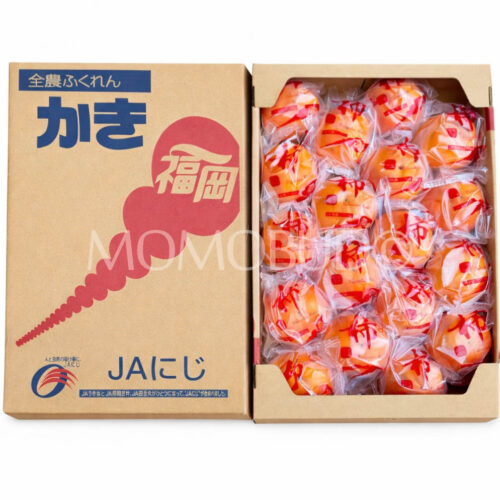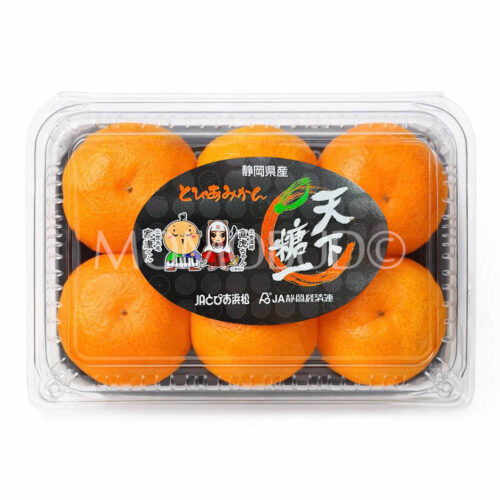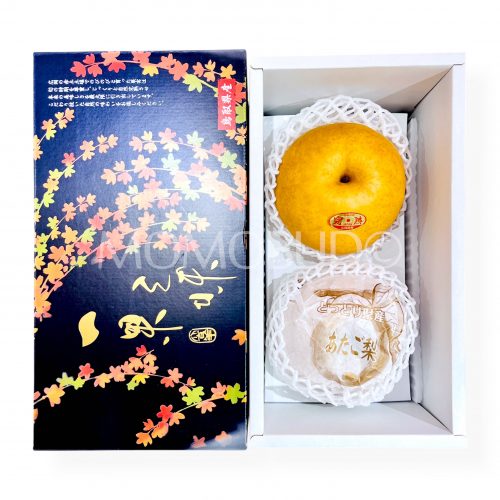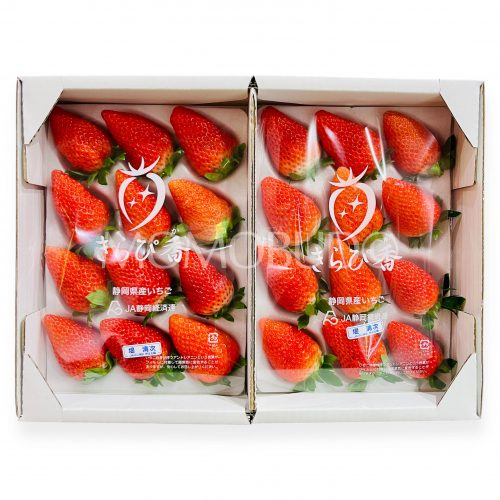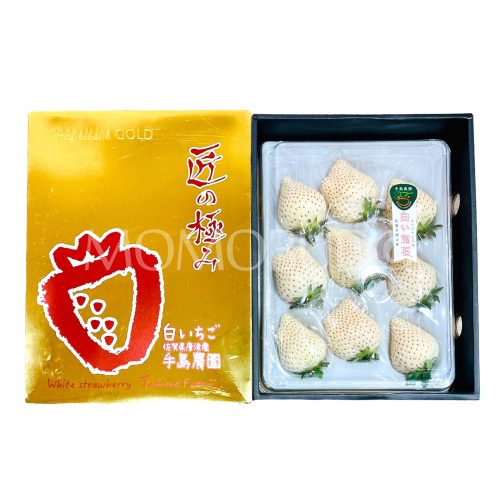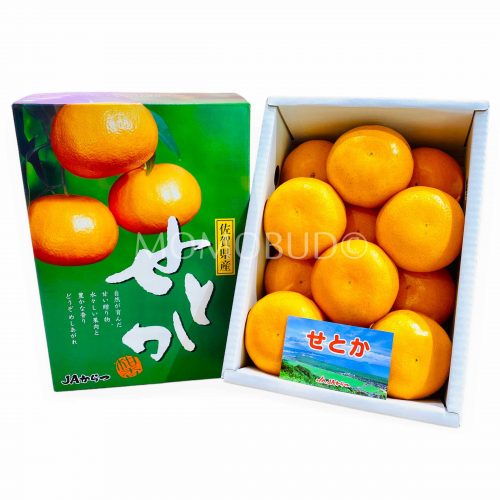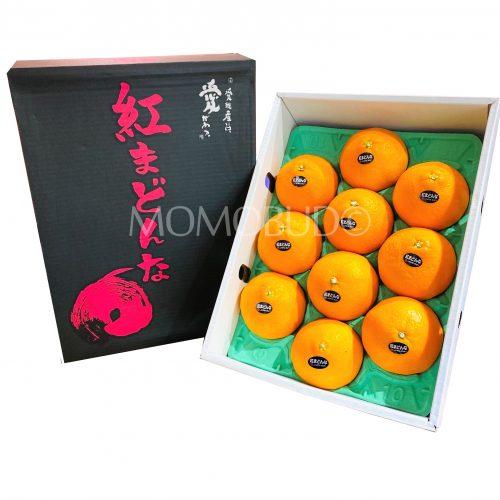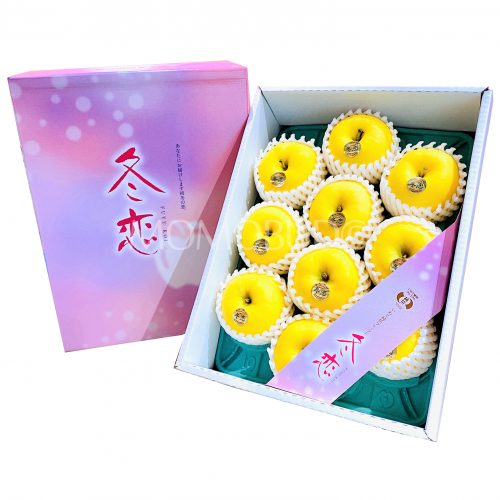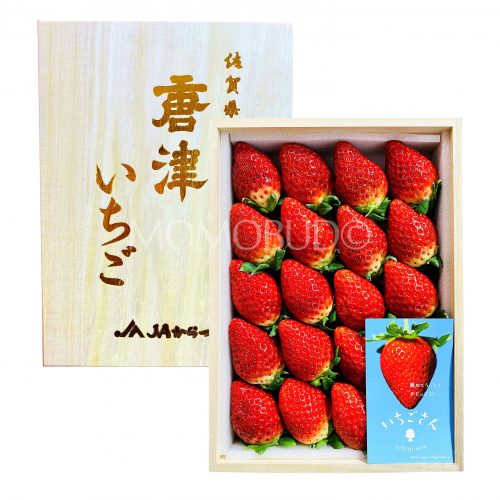Fresh Produce
Fruits are updated daily for the latest availability in the market.
*For deliveries requested 2 days or more in advance, fruits availability will be subjected to changes.
Last Updated on 27 January 2026, 10.20 pm
Showing 1–12 of 35 results
-
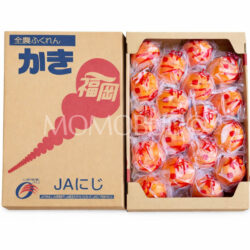
Japanese Fukuoka Fuyu Persimmon (Small-Plus)
$6.50–$135.00Select optionsJapanese Fukuoka Fuyu Persimmon (Small-Plus)
$6.50–$135.00
Fuyu persimmons are the leading non-astringent persimmon and are the most widely cultivated persimmon in the world. Their non-astringency allows for them to be eaten fresh out of hand at various times during maturation, regardless firm or soft. Their texture is similar to apple when firm, but once riped, it will turn soft and juicy with very high sugar content.
Country of Origin: Fukuoka Prefecture, Japan
Nutrition facts: Great Source of Vitamin-C, Vitamin B-6, Antioxidants, and Minerals such as potassium, manganese, copper, and phosphorus.
Health Benefits:
– Reduces the risk of cancer
– Aids in lowering blood pressure
– Provides relief from constipation
– Boosts immune system
– Aids in digestion
– Improves blood circulation
– Prevents signs of premature aging -
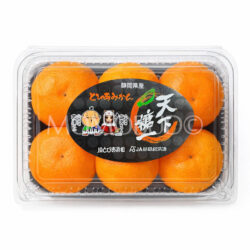
Japanese Tenka Touitsu Mikan (Mandarin Orange, 375g punnet)
$12.00–$22.00Select optionsJapanese Tenka Touitsu Mikan (Mandarin Orange, 375g punnet)
$12.00–$22.00
From Shizuoka, one of Japan’s most renowned citrus kingdoms, comes the Tenka Toitsu Mikan — a mandarin that truly lives up to its name, meaning “The Sweetest Under Heaven.”
Grown in orchards covered entirely with mulch to precisely control soil moisture, each fruit develops a remarkably high sugar content and rich, complex sweetness. Despite careful cultivation, only about 20–30% of the harvest meets the strict quality standards required to bear the Tenka Toitsu name — making every box a rare treat even within Japan.
Each mikan is hand-selected for its brilliant orange hue, thin peel, and honey-like juiciness with a perfect balance of mild acidity. The result is a flavor that’s luxuriously sweet yet refreshingly light, showcasing the craftsmanship and pride of Shizuoka’s top growers.
*Mikans may come in between 4-6pcs per punnet depending on sizes.
Country of Origin: Shizuoka Prefecture, Japan
Nutrition facts: Great Source of A & C, Flavonoids, Phosphorous, Magnesium, Calcium and Fiber.
Health Benefits:
– Rich in antioxidants
– High in fiber that prevents constipation and toxin accumulation
– Prevents macular (eye muscle) degeneration in aging
– Protects against osteoporosis
– Reduces high cholesterol levels
– Lowers risk of cancers and chronic diseases -
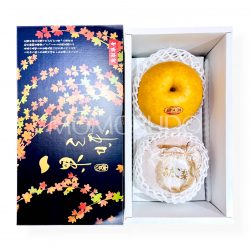
Japanese Kanjuku Atago Nashi Pear Gift Box (2kg)
$98.00Add to cartJapanese Kanjuku Atago Nashi Pear Gift Box (2kg)
$98.00
[Winter Special]
Atago Nashi (愛宕梨) is a jumbo-sized pear, a hybrid of Nijusseiki (“20th Century”) and Imamura-aki, and has a record of growing up to 20 cm in diameter!
What sets the Tottori Kanjuku Atago Pear apart is the Kanjuku (完熟) process, where the fruit fully ripens on the tree. Unlike pears from regions like Okayama, which are harvested early and ripened post-harvest, Tottori’s pears stay on the tree until peak maturity. This results in richer sweetness, juicier texture, and a more intense aroma.
Available during the year-end (Oseibo) season, each pear is individually wrapped and packed in a gift box, making it a perfect, luxurious gift.
Country of Origin: Tottori Prefecture, Japan
Nutrition facts: Great Source of Vitamin-C, Vitamin K, Fiber, Copper and Potassium.
Health Benefits:
– Prevent blood pressure and stroke
– Anti-oxidant
– Lower cholesterol levels
– Relieving fever
– Anti-inflammatory effect
– Build the immune system
– Heal throat and vocal cord -
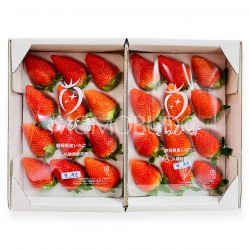
Jumbo Japanese Kirabika Ichigo (Strawberry, 500g pack)
$36.00–$70.00Select optionsJumbo Japanese Kirabika Ichigo (Strawberry, 500g pack)
$36.00–$70.00
A hybrid strawberry variety of Akihime and Beni-Hoppe, Kirabika has an all-rounded fruity-aroma with jewel-shine endocarp, in addition to its excellent balance of sweetness with smooth texture, you will experience pleasant acidity spreading throughout the mouth as the whole taste intensify.
Country of Origin: Shizuoka prefecture, Japan
Nutrition facts: Great Source of Vitamin-A, Vitamin-C, Vitamin-E, Vitamin-K,Calcium, Magnesium, Zinc and Iron.
Health Benefits:
– Burns stored fat
– Boost short term memory
– Low in Calories, High in Fiber
– Ease inflammation
– Lower cardiovascular disease
– Promote bone health
– Prevent esophageal cancer
– Anti-aging properties
– Good for weight loss
– Promote eye health -
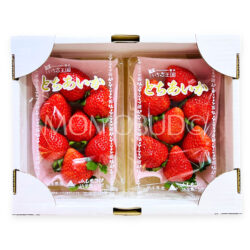
Japanese Tochiaika Ichigo (Strawberry, 280g pack)
$18.00–$34.00Select optionsJapanese Tochiaika Ichigo (Strawberry, 280g pack)
$18.00–$34.00
A new strawberry, also known as “Tochiaika,” was born in Tochigi. It was also called the 10th original variety of Tochigi prefecture, also known as “Tochigi i37”. It is a completely new kind of strawberry that was first shipped from Tochigi in the fall of 2019.
It has a slightly crunchier texture compared to most strawberries but has a rich mellow & fragrant taste, and outstanding high sweetness.
*Quantity will vary depending on strawberry size
Country of Origin: Tochigi prefecture, Japan
Nutrition facts: Great Source of Vitamin-A, Vitamin-C, Vitamin-E, Vitamin-K,Calcium, Magnesium, Zinc and Iron.
Health Benefits:
– Helps burn stored fat
– Boost short term memory
– Low i Calories, High in Fiber
– Ease inflammation
– Lower cardiovascular disease
– Promote bone health
– Prevent esophageal cancer
– Anti-aging properties
– Good for weight loss
– Promote eye health -
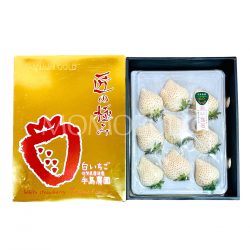
Japanese Jumbo White Jewel (Shiroi Houseki) Ichigo (Strawberry) Gift Box (450g)
$125.00Add to cartJapanese Jumbo White Jewel (Shiroi Houseki) Ichigo (Strawberry) Gift Box (450g)
$125.00
Grown in Teshima farm, known widely for its trademark variety, White Jewel (白い宝石). It has been researched for dozen of years before producing the most ideal variety, in terms of taste, texture, fragrance, sweetness & water content and appearance. Hence, every single strawberry is guaranteed the best quality.
They are not available in large quantities, and are very uncommon in exports. Try out these jewels while they are available in stock and season!
Country of Origin: Saga prefecture, Japan
Nutrition facts: Great Source of Vitamin-A, Vitamin-C, Vitamin-E, Vitamin-K,Calcium, Magnesium, Zinc and Iron.
Health Benefits:
– Burns stored fat
– Boost short term memory
– Low in Calories, High in Fiber
– Ease inflammation
– Lower cardiovascular disease
– Promote bone health
– Prevent esophageal cancer
– Anti-aging properties
– Good for weight loss
– Promote eye health -
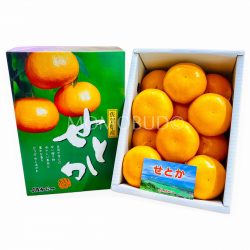
Japanese Setoka Mikan (Mandarin Orange) Gift Box (2.5kg)
$118.00Add to cartJapanese Setoka Mikan (Mandarin Orange) Gift Box (2.5kg)
$118.00For advance order (delivery slots that are not open yet), please place this item in a single cart and indicate your preferred delivery/self collection date under ‘Order Notes’. (Eg. Delivery/Self Collection on __ Jan) if you are unable to select the date in the calendar.
Order Notes:
• Delivery period: 26 Jan to 14 Feb 2026
A combination of seedless, thin skin, pulpy flesh and high brix (sweetness) makes it an absolute healthy and delicious fruit that is only found in Japanese Setoka Mandarin Orange.
*Setoka orange comes in 12-15pcs depending on sizes.
Country of Origin: Saga Prefecture, Japan
Nutrition facts: Great Source of A & C, Flavonoids, Phosphorous, Magnesium, Calcium and Fiber.
Health Benefits:
– Rich in antioxidants
– High in fiber that prevents constipation and toxin accumulation
– Prevents macular (eye muscle) degeneration in ageing
– Protects against osteoporosis
– Reduces high cholesterol levels
– Lowers risk of cancers and chronic diseases -

Premium Japanese Jumbo Kyo no Shizuku Ichigo (Strawberry) Gift Box (Large, 1kg)
$208.00Add to cartPremium Japanese Jumbo Kyo no Shizuku Ichigo (Strawberry) Gift Box (Large, 1kg)
$208.00
Most strawberries are shipped before ripe stage to prevent damage during transportation. However, one of the most special feature is that this strawberry is harvested at dawn, and are transported right at the stage where it can withstand such damage. By the time the destination is reached, the strawberries have perfectly ripened.
In turn, such process is able to bring out the full flavor and sweetness of the strawberries and they also have a higher level of Vitamin C and water content compared to the rest. Don’t miss it when they are available!
Country of Origin: Kyoto prefecture, Japan
Nutrition facts: Great Source of Vitamin-A, Vitamin-C, Vitamin-E, Vitamin-K,Calcium, Magnesium, Zinc and Iron.
Health Benefits:
– Burns stored fat
– Boost short term memory
– Low in Calories, High in Fiber
– Ease inflammation
– Lower cardiovascular disease
– Promote bone health
– Prevent esophageal cancer
– Anti-aging properties
– Good for weight loss
– Promote eye healthIn stock
-

Japanese Kanpei Mikan (Mandarin Orange) Gift Box (3kg)
$148.00Pre-OrderJapanese Kanpei Mikan (Mandarin Orange) Gift Box (3kg)
$148.00For advance order (delivery slots that are not open yet), please place this item in a single cart and indicate your preferred delivery/self collection date under ‘Order Notes’. (Eg. Delivery/Self Collection on __ Jan) if you are unable to select the date in the calendar.
Order Notes:
• Delivery period: 28 Jan to 14 Feb 2026
Kanpei (甘平) is a new variety born from Ponkan (ポンカン), which has a unique sweetness, and Nishinoka (西の香), which has a rich juicy content. This is a limited variety that was just registered in 2007 and is only allowed to be cultivated in Ehime prefecture. It is difficult to grow because of its thin skin which will crack if there is little rain from summer to autumn. Hence, Kanpei is an expensive variety due to its limited production.
The main characteristics of Kanpei are that it has a high sugar content of 13 degree and above, and a low citric acid content of about 1.1%, resulting in a strong sweetness and taste. Kanpei has almost no seeds and you may enjoy the texture of crispy grains due to its thin endothelium. It’s outer skin can be easily peeled off by hand like Satsuma mandarin due to its thinness. It is a masterpiece citrus that is comparable to Setoka.
*Quantity may vary depending on sizes.
Country of Origin: Ehime Prefecture, Japan
Nutrition facts: Great Source of A & C, Flavonoids, Phosphorous, Magnesium, Calcium and Fiber.
Health Benefits:
– Rich in antioxidants
– High in fiber that prevents constipation and toxin accumulation
– Prevents macular (eye muscle) degeneration in aging
– Protects against osteoporosis
– Reduces high cholesterol levels
– Lowers risk of cancers and chronic diseases -
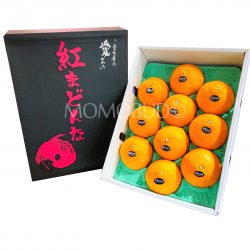
Japanese Premium Black Label Benimadonna Orange
$16.00–$148.00Select optionsJapanese Premium Black Label Benimadonna Orange
$16.00–$148.00
BeniMadonna (紅まどんな) is a hybrid between MinamiKaoru and Amakusa breed. It is large and wide in size with good appearance and taste. Its content is soft and juicy with pulp like jelly. The recommended way to eat is by slicing into slices despite having thin outer skin which is perfectly attached to the pulp. With its excellent texture that spreads throughout your mouth with refreshing juice and scent, you will not get tired no matter how much you eat.
Country of Origin: Ehime Prefecture, Japan
Nutrition facts: Great Source of A & C, Flavonoids, Phosphorous, Magnesium, Calcium and Fiber.
Health Benefits:
– Rich in antioxidants
– High in fiber that prevents constipation and toxin accumulation
– Prevents macular (eye muscle) degeneration in aging
– Protects against osteoporosis
– Reduces high cholesterol levels
– Lowers risk of cancers and chronic diseases -
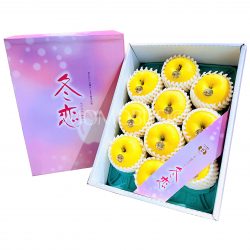
Japanese Iwate Junjo Premium Fuyukoi Apple
$20.00–$188.00Select optionsJapanese Iwate Junjo Premium Fuyukoi Apple
$20.00–$188.00
[Premium Limited]
The apple, which was named “Haruka” in March 2002 and was born in the field of Iwate University in Takizawa Village, Iwate Prefecture, is originally rich in honey and has a strong sweetness.
The excellent cultivation technology and “Haruka” grown in the wilderness of Iwate are further measured one by one with the latest optical sensor to sort out sugar content and honey content, and only the fruits that meet the high sugar standard of 15 degree are are selected and sold as “Iwate Junjou Premium Winter Love”.
Country of Origin: Iwate prefecture, Japan
Nutrition facts: Great Source of Vitamin-C, Vitamin K, Fiber, Copper and Potassium.
Health Benefits:
– Prevent blood pressure and stroke
– Anti-oxidant
– Lower cholesterol levels
– Relieving fever
– Anti-inflammatory effect
– Build Immune system
– Heal throat and vocal cord -
Sale!
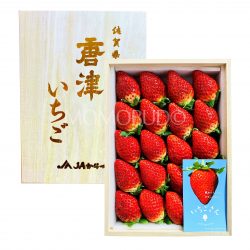
Premium Japanese Ichigosan Strawberry Wooden Gift Box (450g)
$78.00$68.00Add to cartPremium Japanese Ichigosan Strawberry Wooden Gift Box (450g)
$78.00$68.00
Ichigosan gives off strong berry scent which enhance your taste buds, makes it mouth-watering, coupled with high juice content. It’s aesthetically beautiful appearance makes it attractive and are usually used as gifts or cake decorations.
Perfect for gifts as it comes in elegant paulownia wooden box packaging with attractive visual and will never disappoint your recipient with its superb quality.
Country of Origin: Saga prefecture, Japan
Nutrition facts: Great Source of Vitamin-A, Vitamin-C, Vitamin-E, Vitamin-K,Calcium, Magnesium, Zinc and Iron.
Health Benefits:
– Helps burn stored fat
– Boost short term memory
– Low i Calories, High in Fiber
– Ease inflammation
– Lower cardiovascular disease
– Promote bone health
– Prevent esophageal cancer
– Anti-aging properties
– Good for weight loss
– Promote eye health

